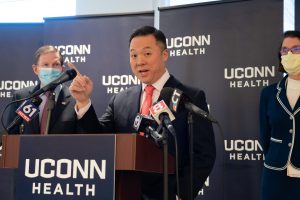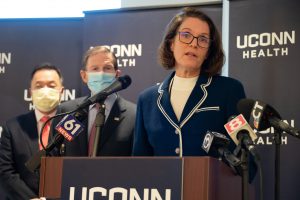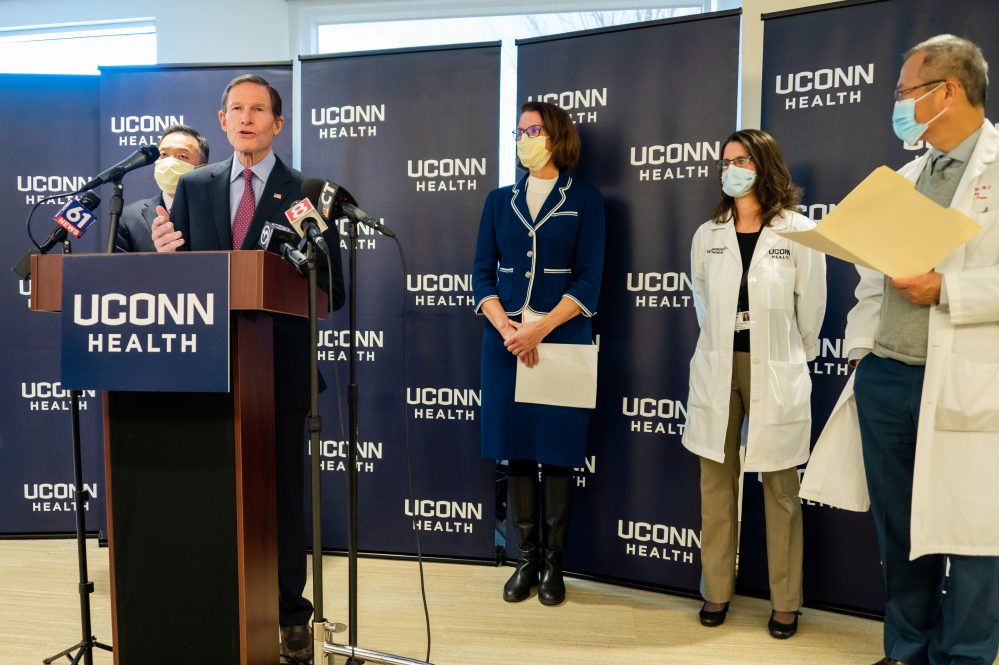
With recreational marijuana now legal in Connecticut, State of Connecticut officials want to keep our smallest children safe from accidentally ingesting edible marijuana such as gummies.
At UConn Health on Jan. 17, U.S. Senator Richard Blumenthal and State Attorney General William Tong and the UConn Health-based Connecticut Poison Control Center called attention to the importance of parents vigorously following child safety measures when it comes to recreational marijuana use.
Health experts are most concerned about the dangers for our pediatric population of small children under 6, especially toddlers. A recent study showed nationally that 1 in 5 children who accidentally eat edibles are admitted to the hospital. This staggering statistic showcases the potential severity of this child safety issue. An issue that is totally preventable.
“We need to make sure we are doing all we can to protect our children,” said Dr. Bruce T. Liang, interim CEO of UConn Health, at the Tuesday press conference. “The Connecticut Poison Control Center is based at UConn Health and serves the entire state 24/7. It is part of the public service mission UConn Health delivers. Due to the legalization of recreational marijuana, we are expecting a huge uptick in calls to our Connecticut Poison Control Center. We need to do everything we can to prevent calls and ensure our littlest ones are kept safe.”
If Connecticut follows the data trends of other states post-legalization of recreational marijuana, the Connecticut Poison Control Center may see more than a 1,300 percent jump or 10-fold increase in calls regarding accidental ingestion of marijuana gummies.
“Beware,” stressed Sen. Blumenthal to parents everywhere. “They receive calls day-in and day-out,” he said about staff at the Connecticut Poison Control Center at UConn Health.

“Put these cannabis products out of reach,” Blumenthal added. “There is no substitute to parental vigilance. If cannabis is in reach, it is a potential danger.”
“Keep your recreational cannabis away from kids. These risks are real,” also shared Connecticut Attorney General Tong. “Thank you to UConn Health for housing and operating our state Poison Control Center, 24/7. You do it so well.”
Dr. Suzanne Doyon is medical director of the Connecticut Poison Control Center based at UConn Health and is an Emergency Medicine physician at UConn John Dempsey Hospital.
“My key message is marijuana poisonings are preventable. The way to prevent them is to keep it away from small hands,” says Doyon.
Dr. Jody Terranova, a longtime pediatrician of UConn School of Medicine, couldn’t agree more.
“On behalf of pediatricians across the state we are glad the Connecticut Poison Control Center is right here at UConn. It takes all of us together to keep children safe,” says Terranova who will soon depart UConn Health to become Deputy Commissioner for the State of Connecticut’s Department of Public Health. She also serves as president of the CT Chapter of the American Academy of Pediatrics.

“With legalization we are calling on everyone to make sure children are not harmed by these products,” says Terranova. “Keep them out of sight and out of reach.”
Together, Doyon and Terranova advise parents to save the Connecticut Poison Control Center phone number in their phones: 1-800-222-1212 and urge parents to never be afraid to call so their child can receive the proper medical attention.
According to Doyon, if marijuana edibles are ingested by small children, parents need to be aware of these potential warning signs:
- Sleepiness and lethargy
- Progressive decline in responsiveness
- Unresponsiveness
- Nausea and vomiting
If your child ingests a marijuana edible, call the Connecticut Poison Control Center right away at 1-800-222-1212.
“Let the experts at the Connecticut Poison Control Center guide you,” says Doyon.

Note, parents may not realize initially that their small child has ingested edibles. In Emergency Departments children in need of medical attention are often identified as having ingested marijuana following testing and parental questioning.
Prior to the legalization of recreational marijuana, the Connecticut Poison Control Center at UConn Health was being alerted to 1 child a month dangerously ingesting marijuana in baked goods and approximately 5 children a month (or 60 a year) ingesting edible marijuana gummies. For example, since 2020 the Connecticut Poison Control Center has reported nearly 200 hundred cases of marijuana edible ingestion in children under age 19. The majority of them were sent to the emergency department, and about one-third were ultimately admitted to the hospital.
According to the Connecticut Poison Control Center experts, edibles sold in Connecticut should be properly and lawfully individually wrapped, sold in child-resistant containers—like those used for other medicines, and safeguarded away from children. They stress these basic safeguards will help protect our children and keep them safe.




















